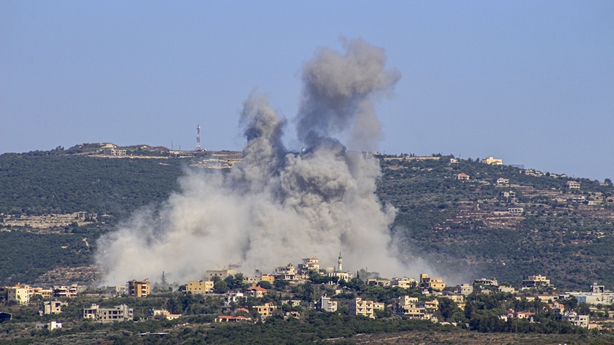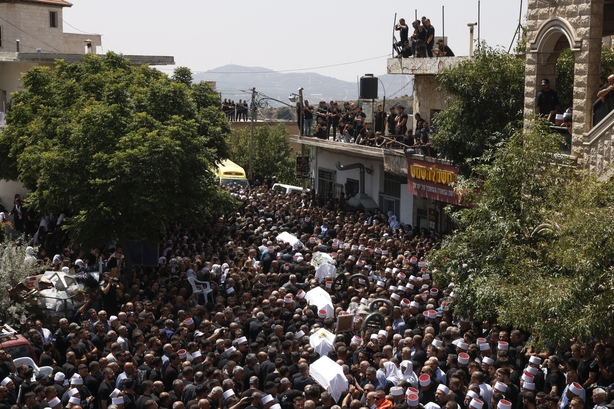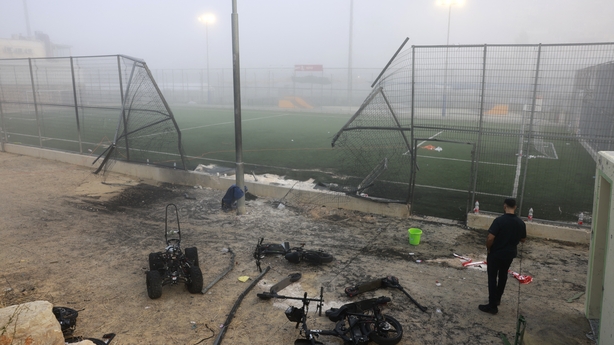Israel's security cabinet has authorised Prime Minister Benjamin Netanyahu's government to decide on the "manner and timing" of a response to a rocket strike in the Israeli-occupied Golan Heights that killed 12 teenagers and children, and which Israel and the United States blamed on Lebanese militant group Hezbollah.
Hezbollah denied responsibility for the attack on Majdal Shams yesterday, the deadliest in Israel or Israeli-annexed territory since Palestinian militant group Hamas's 7 October attack prompted the war in Gaza.
That conflict has spread to several fronts and risks spilling into a wider regional conflict.
Israel has vowed retaliation against Hezbollah in Lebanon and Israeli jets have hit targets in southern Lebanon.
But there were expectations a stronger response could follow the security cabinet meeting convened by Mr Netanyahu in Tel Aviv.
After the meeting ended, Mr Netanyahu's office said the cabinet "authorised the Prime Minister and the Defence Minister to decide on the manner and timing of the response".

The White House also blamed Hezbollah for the Majdal Shams strike.
"This attack was conducted by Lebanese Hezbollah. It was their rocket and launched from an area they control," it said in a statement.
The US said Washington has been in discussions with Israeli and Lebanese counterparts since yesterday's attack, which it condemned and described as "horrific," and that it was working on a diplomatic solution.
US Secretary of State Antony Blinken said Washington stood by Israel's right to defend itself, but that it did not want further escalation of the conflict, which has seen daily exchanges of fire between the Israeli military and Hezbollah along the border.
Britain expressed concern at further escalation while Egypt said the attack could spill "into a comprehensive regional war".
On the ground, thousands of people gathered for funerals in the Druze village of Majdal Shams in the Golan Heights, territory captured from Syria by Israel in the 1967 Middle East war and annexed in a move not recognised by most countries.

Members of the Druze faith - which is related to Islam, Christianity and Judaism - make up more than half the 40,000-strong population of the Golan Heights.
Large crowds of mourners, many in traditional high white and red Druze headwear, surrounded the caskets as they were carried through the village.
"A heavy tragedy, a dark day has come to Majdal Shams," said Dolan Abu Saleh, head of the Majdal Shams local council, in comments broadcast on Israeli television.
Hezbollah initially had announced it fired rockets at Israeli military sites in the Golan Heights, but said it had "absolutely nothing" to do with the attack on Majdal Shams.
However, Israel said the rocket was an Iranian-made missile fired from an area north of the village of Chebaa in southern Lebanon, placing the blame squarely on Iranian-backed Hezbollah.
We need your consent to load this rte-player contentWe use rte-player to manage extra content that can set cookies on your device and collect data about your activity. Please review their details and accept them to load the content.Manage Preferences
It was not immediately clear if the children and teenagers killed in the strike were Israeli citizens, but Israeli officials have vowed retaliation.
"The rocket that murdered our boys and girls was an Iranian rocket and Hezbollah is the only terror organisation which has those in its arsenal," Israel's foreign ministry said.
Following the Golan Height's attack yesterday, the Irish Defence Forces said that Irish personnel serving in Golan Heights were safe.
It added that the 332 Irish peacekeepers currently serving with the 124th Battalion in the United Nations Interim Force in Lebanon were also "safe and well" after the attack.
Hezbollah is on high alert and had cleared out some key sites in both Lebanon's south and the eastern Bekaa Valley in case of an Israeli attack, two security sources told Reuters.
Lebanon's Middle East Airlines said it was delaying the arrival of some flights from tonight to tomorrow morning, without stating why.
In the southern port city of Tyre, a little over 20km from the border, beachgoers were still streaming to the coast.
"There's fear that Israel will react, but people are living their life normally," said Ali Husseini, manager of a beachside business in Tyr.
Israeli forces have been exchanging fire for months with Hezbollah fighters in southern Lebanon but both sides have appeared to be avoiding an escalation that could lead to a wider war, potentially dragging in other powers including the United States and Iran.
However, yesterday's strike threatened to tip the standoff into a more dangerous phase.
United Nations officials urged maximum restraint from both sides, warning that escalation could "engulf the entire region in a catastrophe beyond belief".
Lebanon has asked the US to urge restraint from Israel, Lebanon's foreign minister Abdallah Bou Habib told Reuters.
Mr Bou Habib said the US had asked Lebanon's government to pass on a message to Hezbollah to show restraint as well.
Iran's foreign ministry warned Israel against what it called any new adventure in Lebanon.

Syria's foreign ministry said it held Israel "fully responsible for this dangerous escalation in the region" and said its accusations against Hezbollah were false.
All efforts were now needed to avoid an all out war, two diplomats focused on Lebanon said.
The conflict has forced tens of thousands of people in both Lebanon and Israel to leave their homes.
Israeli strikes have killed some 350 Hezbollah fighters in Lebanon and more than 100 civilians, including medics, children and journalists.
The Israeli military said after the Golan Heights attack the death toll among civilians killed in Hezbollah attacks had risen to 23 since October, along with at least 17 soldiers.
Hezbollah is the most powerful of a network of Iran-backed groups across the Middle East and opened a second front against Israel shortly after Hamas's 7 October assault.
Iraqi groups and the Houthis of Yemen have both fired at Israel, which earlier this month attacked the Red Sea port of Hodeidah in retaliation for a strike on Tel Aviv that killed one person.
Hamas has also carried out rocket attacks on Israel from Lebanon, as has the Lebanese Sunni group, the Jama'a Islamiya.
Druze communities live on both sides of the line between southern Lebanon and northern Israel as well as in the Golan Heights and Syria.
While some serve in the Israeli military and identify with Israel, many feel marginalised in Israel and some also reject Israeli citizenship.

